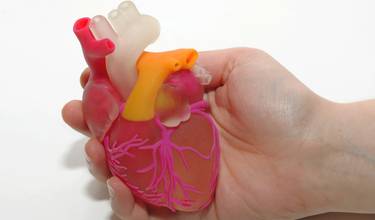What is atrial fibrillation?
Atrial fibrillation, or AFib, is one of the most common types of heart arrhythmia. Usually, the heart’s electrical impulses will arise from a group of specialised muscle cells in the right atrium called the sinoatrial node, and from this point, they are forwarded to the rest of the heart. The sinoatrial node thus controls the heart rhythm and it is responsible for contracting the heart regularly. In the event of atrial fibrillation, these electrical impulses will arise from different parts of the atria and thus not from the sinoatrial node. This causes the heart’s contractions to become fast and irregular. The frequent activation of the atria is prevented from spreading to the heart’s ventricles due to what is known as a conduction system.
This irregular heart rhythm can occur briefly for minutes or hours, whereas long-term attacks of atrial fibrillation can last for days or weeks. In most cases, the irregular heart rhythm will stop on its own, but if it doesn’t, the atrial fibrillation will become chronic.
What are the symptoms of atrial fibrillation?
The symptoms of atrial fibrillation vary. Not all patients with atrial fibrillation experience all symptoms, and the disease can manifest itself differently from person to person. The symptoms include:
- Fast irregular pulse
- Dizziness
- Shortness of breath
- Satiety
- Chest pains
- Being out of condition
- A feeling of unease or anxiety
- Fatigue
What are the causes of atrial fibrillation?
Atrial fibrillation can be caused by increased impulse activity in the pulmonary veins, which leads oxygenated blood from into the left atrium, but the cause of this increased impulse activity is unknown.
In addition, several factors are associated with a greater susceptibility to atrial fibrillation. These factors include:
- Advanced age
- Heart disease
- High blood pressure
- Hypermetabolism
- Being male
- Diabetes
- Chronic Obstructive Pulmonary Disease
- Decreased kidney function
- Excessive alcohol consumption
If you suffer from atrial fibrillation already, several factors can lead to new “attacks”:
- Stress
- Fevers
- Alcohol
- Coffee
- Mental stress
- Acute illness
What are the complications of atrial fibrillation?
Generally, the condition is not dangerous. However, atrial fibrillation can cause life threatening complications, and it is important that it is diagnosed as quickly as possible, so that the correct treatment can be initiated and the risk of complications reduced.
Atrial fibrillation is associated with:
- Apoplexy: The irregular contraction of the heart means that it is not able to pump blood effectively. When the blood moves more slowly, it is more likely to form clots, and these clots may break loose and travel to the rest of the body, including the brain. When this blood clot reaches the small blood vessels in the brain, it will cause a stroke or apoplexy. Blood-thinning drugs help prevent blood clots from forming, thus reducing the risk of apoplexy.
- Heart failure: If the heart beats too fast, there is a risk that the heart muscle becomes weak, and the pumping function is reduced. It is therefore recommended to receive treatment if you experience an elevated heart rate.
What are the treatments for atrial fibrillation?
The treatment of atrial fibrillation involves restoring the heart to a normal rhythm and decreasing the risk of complications. The treatment thus involves blood thinners, which help prevent blood clots from forming. The arrhythmia can be treated with medications that prevent atrial fibrillation from occurring, for instance beta blockers. Some patients will be treated using electric shock to stop all impulses and thus reset the heart rhythm. By doing so, the heart rhythm will once again be regular and controlled by the sinoatrial node.


